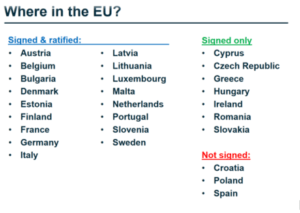Blog
Registration as a Unitary Patent
Fish & Richardson
Authors
-
- Name
- Person title
- Principal

-
- Name
- Person title
- Principal

-
- Name
- Person title
- Of Counsel

One of the beauties of the European patent with unitary effect (Unitary Patent) is that nothing is changed in the European patent application right up to grant by the EPO. The Unitary Patent is simply a registration option after grant of the European Patent. National validation of European Patents at the time of grant will continue to be available as an alternative to the Unitary Patent, and—if a Unitary Patent is elected—for those EPO member states that are not participating in the Unitary Patent arrangement.
If you want a Unitary Patent based on an application that is pending, you may have to delay grant until the EPO is authorized to register Unitary Patents, which is expected to begin in early in 2023, as explained below.
The Start Date
Because the Unified Patent Court (UPC) is intended to have exclusive competence (jurisdiction) for litigation involving infringement and validity of Unitary Patents, EU Regulation 1257-2012, establishing the Unitary Patent right, set the date on which the EPO can begin registering Unitary Patents as the date when the UPC will open to receive cases, in accordance with the UPC Agreement. The EPO has said it is ready; therefore, we are waiting for the UPC to complete its preparations and announce its start date. As one might imagine, UPC preparations are complicated.
On 19 January 2022, the UPC entered into a Period of Preliminary Application (PPA) of the UPC Agreement. As a practical matter, that means that the UPC can be organized, judges and staff can be hired, courtrooms and IT systems can be prepared, but the new court cannot yet receive cases. That period will continue for an estimated period of four to eight months, until the UPC Administrative Committee decides the court will be about three months from opening.
The UPC Agreement provides a mechanism for triggering the opening of the UPC on the first day of the fourth month after the minimum number of ratifications of the UPC Agreement are deposited. That minimum has been satisfied except the deposit of ratification papers by Germany. By informal agreement, Germany is withholding its deposit until the Administrative Committee says it will be ready. For example, if Germany deposits its ratification in February 2023, the UPC will open on 1 June 2023. The period between the deposit of German ratification and the Start Date is referred to as the “Sunrise Period.”
General Considerations
The primary, general consideration in preparing for possible registration of a European patent application as a Unitary Patent is to be aware of the deadlines. In particular, a complete request for registration as a Unitary Patent is due one month after grant of the European Patent by the EPO, not three months after grant, as is the case for validation of the EP as national patents. The request must include the single, required translation discussed in Step 4 below.
If you have more than one or two pending European patent applications, you may want to consider your initial, general policies for Unitary Patents in advance. There will be limited time to decide once you receive a Communication of intent to grant a European Patent from the EPO. In particular, you will want to consider the cost aspects, and whether or not use of the UPC may be advantageous.
There is a probable saving of costs at the time of registration for the Unitary Patent as compared with validation of the European Patent as a bundle of national patents. The single annual maintenance fee, paid to the EPO, is projected to be approximately the same as the sum of maintenance fees for the Top 4 participating states, in terms of number of validations, France, Germany, Italy and the Netherlands. However, because the UP is unitary, you will not be able to reduce maintenance fees in later years by dropping maintenance in some states while keeping the patent alive in others. See our Unitary Patent Costs page.
A big advantage of the Unitary Patent is that it will provide protection in 17 EU states for the cost of the Top 4. Also, the patent can be enforced in a single UPC action, and damages and injunction may be obtained with respect to infringing acts in all 17 states, regardless of where the infringer is domiciled. That could be especially important when the infringer is domiciled outside the UPC participating states. A fear of some, however, is the possibility of central attack by a revocation action in the UPC, which might result in revocation for all 17 participating states. The litigation advantages and disadvantages for the Unitary Patent are analogous to those that might be considered in deciding whether or not to opt-out from the UPC for conventional European Patents. Some Questions Patent Owners May Ask Themselves Regarding Opt-Out, which you may also consider in deciding whether or not to obtain a Unitary Patent.
Step 1 – Eligibility Check
The first step in registering a European Patent application as a Unitary Patent is to make sure that the application is eligible for Unitary Patent registration. (You need not waste time on the other steps if the request would be futile.)
The principal requirement is that the granted application will have the same claims for all 25 states that were authorized by EU Council Decision 2011/167/EU to participate in enhanced cooperation in the creation of unitary patent protection. Those states include all of the states that have signed and ratified the UPC Agreement, plus those that have signed but not yet ratified the Agreement and Poland. All of these states must have been designated in the European Patent application. See the lists of states below:

As a general rule, European Patents based on applications filed in the EPO before 1 March 2007 are not eligible for registration as Unitary Patents, because Malta joined the EPO on that date; therefore, Malta could not have been designated and there were no claims for Malta in such applications. Further, in case that Croatia signs and ratifies the UPC Agreement at a later date, a unitary patent will only be available for pending European applications which were filed on or after 1 January 2008, namely the date on which Croatia joined the EPC and, hence, the date on which there will be a set of claims in all of the UP participating states.
Most applications filed on or after 1 April 2009 are likely to be eligible for registration as Unitary Patents, because it became possible then to designate all EPO states by checking a box on the application and most applicants checked that box. You should review your application to be sure.
Step 2 – The UP Registration Decision
The decision of whether or not to register a European patent as a Unitary Patent must be made before one month after the publication in the EPO Bulletin of the grant of the European patent, not three months after that date as is the case for validation of a European Patent as a national patent. Ideally, that decision should be made and your professional representative should be instructed no later than the time of the response to the Communication under R. 71(3) EPC from the EPO of its intention to grant a European Patent, because the time between that response and grant of the European Patent is short and unpredictable.
At this step, you will have to make the registration decisions for the specific patent application, for example, in light of factors identified in the “General Considerations” discussed above.
Step 3 – Ownership
The request for registration as a Unitary Patent must be made in the name of all owners (proprietors) and the name(s) of the requester(s) must correspond to the proprietors mentioned in the European Patent Register. (See Step 6A below). The real owner(s) may not be the same as the applicant(s) originally listed in the EPO Register. Therefore, a check should be made regarding the ownership and appropriate assignment documents should be filed at the EPO, if necessary. (Remember that the EPO requires that assignments be signed by both Assignors and Assignees, unlike U.S. practice.)
If ownership is divided, please consult your professional representative (patent attorney) regarding additional requirements and consequences. Remember that all owners will have to join in all actions involving the Unitary Patent. If registration as a Unitary Patent is elected, an appropriate agreement should be made between the owners.
Step 4 – Representation
The UP registration request typically will be submitted by the professional representative (patent attorney) who handled the European Patent application. If there are no ownership issues, the representative may not require any further appointment. However, if there are multiple owners, an appointment will be required from each owner, and new appointment(s) are required if there have been ownership changes.
Step 5 – Translation
During at least the first six years of the Unitary Patent arrangement, a single translation will be required at the time of requesting registration as a Unitary Patent. If the language of the EPO proceedings is French or German, this translation must be into English. If the language of the EPO proceedings is English, then the translation may be into any into any other official language of the European Union.
Article 6(2) of EU Regulation No. 1260/2012, which created this translation requirement, provides that “The text of such translations shall have no legal effect and shall be for information purposes only.” The EPO has stated that this translation will not be examined by the EPO. If any translation is necessary in Unitary Patent litigation, an appropriate translation can be submitted at that time.
Because the complete request for unitary effect, including the translation, must be filed no later than one month after the mention of the grant of the European patent is published in the European Patent Bulletin, steps should be taken to obtain this translation promptly after receipt of the Rule 71(3) Communication of intent to grant a European Patent. The translation can be the same one that will be used for validation of the European Patent in EU states not currently participating in the Unitary Patent arrangement.
This also is a good time to order translations that may be required for states not participating in the Unitary Patent arrangement in which you want to validate the European Patent, which require translations at the time of validation.
Step 6 – Respond to the Rule 71(3) EPC Communication
As in the case of all European Patent applications, a response to the Rule 71(3) EPC Communication from the EPO, which indicates its intent to grant a patent, must be filed within four months. Briefly, that response should include the fee for grant and publishing of the patent, any fees not previously paid for claims in excess of 15, and a translation of the claims in the two official languages of the European Patent Office other than the language of the proceedings. The applicant’s approval of the text of the patent is presumed if no amendment or correction of the patent’s text is requested and the fees are paid; however, the best practice is to explicitly approve, amend or correct the claims. If the applicant makes timely, reasoned amendments or corrections to the communicated text or keeps to the latest submitted text without accepting the EPO’s communicated text, the EPO will issue a new communication with a new response period.
If you want to request a Unitary Patent for the participating states when you receive the Rule 71(3) Communication, you should check whether or not Germany has deposited its ratification of the UPC Agreement, which will start the Sunrise Period for requesting a Unitary Patent. If the Sunrise Period has not begun, consult your professional representative (patent attorney) about possibly requesting an amendment of the text of the patent in the Response to the Rule 71(3) Communication, which will delay the patent grant and should permit requesting a Unitary Patent after the Sunrise Period begins.
Step 7A – Filing the Request for Unitary Effect–Generally
The Request for unitary effect (a Unitary Patent) can only be made after receipt of the Rule 71(3) EPC Communication and after the Sunrise Period begins (see Step 6B below), and must be made no later than one month after the mention of the grant of the European patent is published in the European Patent Bulletin. The Request should preferably be filed online, using Form UP 7000 (request for unitary effect). The EPO has informed us that form will be available at the beginning of the Sunrise Period.
Briefly,
- The requester must be the proprietor mentioned in the European Patent Register at the date of filing of the request for unitary effect or, at the latest, at the date of registration of unitary effect. Additional EPO Unitary Patent Rules (“UPR”) apply if there is more than one proprietor.
- The Request must be duly signed in accordance with the UPR. It may be signed by the representative if one has been appointed.
- The Request for unitary effect must contain the following information (Rule 6(2) UPR):
- (a) particulars of the proprietor(s) of the European patent making the request as provided for in Rule 41(2)(c) EPC;
- (b) the number of the European patent to which unitary effect is to be attributed;
- (c) where the requester has appointed a representative, particulars as provided for in Rule 41(2)(d) EPC.
- The Request must contain a translation of the European patent as required under Article 6(1) Regulation (EU) No 1260/2012:
- Where the language of the proceedings is French or German, a full translation of the specification of the European patent into English must be submitted; or
- Where the language of the proceedings is English, a full translation of the specification of the European patent into any other official language of the European Union must be submitted.
- The Request may include a voluntary indication of a place of business of the first applicant on the date of filing of the European patent application. (That place of business may determine the applicable national law for the treatment of the patent as an object of property.)
Further details concerning the requirements for a Request for registration as a European patent with unitary effect (Unitary Patent) are in Part B.II of the EPO’s Unitary Patent Guide (2nd ed. April 2022) here.
Step 7B – Preparations Before the Start Date
The EPO’s authority to register European patents with unitary effect (Unitary Patents) will begin on the Start Date, discussed above. If you want to request a Unitary Patent before the Start Date, you should check whether or not Germany has deposited its ratification of the UPC Agreement, which will start the Sunrise Period for requesting a Unitary Patent. If the Sunrise Period has not begun, consult your professional representative (patent attorney) about possibly requesting an amendment of the text of the patent in the Response to the Rule 71(3) Communication, which will delay the patent grant so that a Unitary Patent can be requested after the Sunrise Period begins.
The EPO offers two Unitary Patent transitional measures during the Sunrise Period, which runs from the date when Germany has deposited its ratification of the UPC Agreement until the Start Date on the first day of the fourth month after that deposit.
The first transitional measure enables applicants to file early requests for unitary effect during the Sunrise Period. This will allow the EPO to register unitary effect immediately at the Start Date, provided all requirements are met. The EPO expects to process such requests and communicate with the applicant’s representative regarding any deficiencies so that they can be corrected before the Start Date.
The second transitional measure during the Sunrise Period permits the applicant to request a delay in issuing the decision to grant a European patent after dispatch of a communication under Rule 71(3) EPC by the Office and before approving the text intended for grant. This avoids the need to amend the text in order to delay grant. The EPO has informed us that the form for such requests will be available at the beginning of the Sunrise Period.
For the EPO notice about these transitional measures, see here.
For more information about Unitary Patents and the Unified Patent Court, please contact Fish attorneys Bernhard Lorenz, Moritz Ammelburg, or Patrick Finn.
Updated 6 December 2022.
The opinions expressed are those of the authors on the date noted above and do not necessarily reflect the views of Fish & Richardson P.C., any other of its lawyers, its clients, or any of its or their respective affiliates. This post is for general information purposes only and is not intended to be and should not be taken as legal advice. No attorney-client relationship is formed.